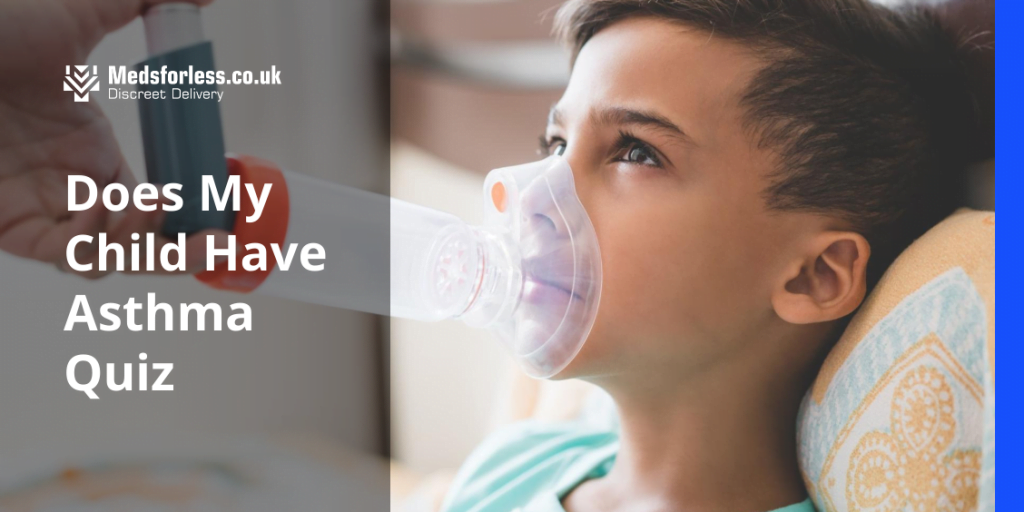Back To Top
Introduction: Demystifying Asthma in Children Asthma is a common respiratory condition that affects millions of children worldwide. Understanding its early signs and symptoms is vital...

Asthma is a common respiratory condition that affects millions of children worldwide. Understanding its early signs and symptoms is vital for timely intervention and effective management. In this blog, we’ll shed light on asthma, its potential indicators in children, and a helpful quiz to assess your child’s risk. Let’s embark on this journey to decipher asthma in kids.
Before we dive into the details, let’s kickstart your journey with our interactive quiz. Answer these 10 yes/no questions to gain insights into your child’s potential asthma risk:
For each “Yes” answer, allocate one point to your quiz score. The total score will provide insights into your child’s potential asthma risk.
Remember, this quiz serves as an initial step in understanding your child’s respiratory health. Official diagnosis and guidance should always come from a qualified medical professional. Your child’s well-being is paramount, and seeking timely medical advice can make all the difference in managing asthma effectively.
Childhood asthma comes with its unique set of challenges, from identifying common triggers to implementing effective management strategies. Dive into this guide to uncover prevalent asthma triggers in children and learn practical approaches to ensure their respiratory well-being.
Here are a couple of asthma triggers:
1. Allergens: Allergens such as pollen, dust mites, pet dander, and mold can often trigger asthma symptoms in children. Exposure to these allergens can lead to airway inflammation and increased asthma symptoms.
2. Respiratory Infections: Viral respiratory infections, such as the common cold or flu, are common triggers for asthma exacerbations in children. These infections can cause inflammation in the airways, making it difficult for children with asthma to breathe.
Understanding and managing these triggers is crucial for effectively controlling asthma in children.
Effective Management Strategies could include:
1. Asthma Action Plan: Develop and regularly update an asthma action plan in consultation with your child’s healthcare provider. This plan should outline daily management, including medication schedules, as well as steps to follow during asthma exacerbations or emergencies.
2. Identify and Avoid Triggers: Work with your child’s healthcare provider to identify specific asthma triggers and develop strategies to minimize exposure. This may involve reducing allergens in the home, ensuring proper ventilation, and avoiding tobacco smoke and air pollution.
3. Medication Adherence: Ensure that your child takes their asthma medications as prescribed, including both controller and rescue medications. Teach them how to use inhalers and spacers properly to maximize the effectiveness of the medication.
Here at Meds for Less , you can find a wide variety of effective treatments for asthma such as:
i) Buy Ventolin Inhaler Online : Ventolin, also known as salbutamol, is a fast-acting rescue inhaler used to provide quick relief from acute asthma symptoms.
ii) Buy Bricanyl Turbohaler : Bricanyl, powered by the active ingredient terbutaline, is a swift-acting bronchodilator inhaler designed to offer rapid relief from sudden asthma symptoms.
iii) Buy Symbicort Turbohaler : Symbicort Turbohaler is a combination inhaler that contains budesonide and formoterol. It serves as both a controller and a reliever medication for asthma.
You can also browse more of our medications and inhalers for Asthma on our asthma treatments page.
4. Monitor Symptoms: Keep a close eye on your child’s asthma symptoms and peak flow measurements if applicable. Regular monitoring can help you and your child’s healthcare provider adjust the treatment plan as needed.
5. Healthy Lifestyle: Encourage a healthy lifestyle for your child, including regular exercise and a balanced diet. Physical activity can improve lung function, while a nutritious diet can support overall health.
6. Education and Support: Educate your child about their asthma, including recognizing symptoms and using medications. Ensure they know when and how to seek help during an asthma attack. Additionally, seek support and guidance from healthcare professionals and asthma support groups to better manage your child’s condition.
These management strategies, when implemented consistently, can help children with asthma lead active, healthy lives while minimizing the impact of asthma on their daily activities.
No FAQs available.
Fast, Discreet, and Convenient
We're here to support :)
We are available Monday through Friday from 9am to 4pm. Do not use this service if you need urgent assistance. You should call 111 or 999 in an emergency. See our help section for more information.
Payment Options




| Cookie | Duration | Description |
|---|---|---|
| cookielawinfo-checkbox-analytics | 11 months | This cookie is set by GDPR Cookie Consent plugin. The cookie is used to store the user consent for the cookies in the category "Analytics". |
| cookielawinfo-checkbox-functional | 11 months | The cookie is set by GDPR cookie consent to record the user consent for the cookies in the category "Functional". |
| cookielawinfo-checkbox-necessary | 11 months | This cookie is set by GDPR Cookie Consent plugin. The cookies is used to store the user consent for the cookies in the category "Necessary". |
| cookielawinfo-checkbox-others | 11 months | This cookie is set by GDPR Cookie Consent plugin. The cookie is used to store the user consent for the cookies in the category "Other. |
| cookielawinfo-checkbox-performance | 11 months | This cookie is set by GDPR Cookie Consent plugin. The cookie is used to store the user consent for the cookies in the category "Performance". |
| viewed_cookie_policy | 11 months | The cookie is set by the GDPR Cookie Consent plugin and is used to store whether or not user has consented to the use of cookies. It does not store any personal data. |